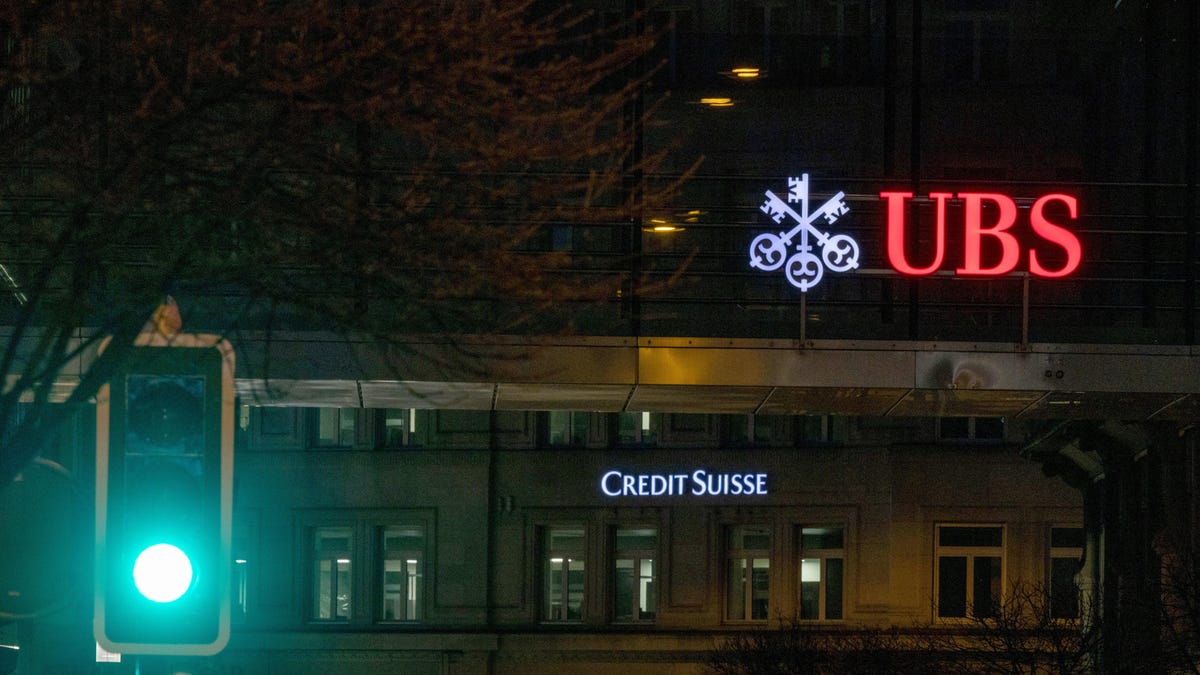UBS’s takeover of Credit Suisse failed to reassure markets
Jittery markers don’t feel reassured by UBS’s takeover of Credit Suisse.Read more……


Jittery markers don’t feel reassured by UBS’s takeover of Credit Suisse.
For Credit Suisse to have found a buyer instead of collapsing should have been good news. But the battered Swiss bank’s shares plunged 62% during pre-market trading today (Mar. 20), and its rival-turned-rescuer saw shares dip over 7%.
- Off
- English
On Sunday (Mar. 19), Credit Suisse and UBS entered into a merger agreement following the intervention of the Swiss Federal Department of Finance, the Swiss National Bank, and the Swiss Financial Market Supervisory Authority FINMA (FINMA). “UBS will be the surviving entity upon closing of the merger transaction,” Credit Suisse said in its press release.
Because the Swiss Federal Council is issuing an emergency ordinance (Notverordnung), the merger will be implemented without the otherwise necessary shareholder approval from both banks. It is expected to be finalized by the end of 2023. In the meantime, Credit Suisse will continue business as usual.
Advertisement
Credit Suisse’s rescue, by the digits
3 billion Swiss franc ($3.2 billion): How much UBS is paying to buy Credit Suisse
60%: Discount to stock value at Friday (Mar. 17) closing
1: UBS shares Credit Suisse shareholders will receive for every 22.48 shares they hold in Credit Suisse
Advertisement
16 billion Swiss franc ($17.2 billion): Additional tier 1 bonds that will be completely written down as part of the deal. These bonds, introduced after the 2008 global financial crisis, are high-yield securities that typically have loss-absorbing features. Much to the chagrin of bondholders, AT1 bonds were “created for moments like this,” John McClain, portfolio manager at Brandywine Global Investment Management, told Fortune
$5 billion: The size of the combined entity’s “total invested assets and sustainable value opportunities,” according to UBS
Advertisement
50 billion Swiss franc ($54 billion): Credit line Credit Suisse tapped from the Swiss National Bank on Mar. 16 as a liquidity backstop to help keep investor confidence up
100 billion franc ($110 billion): Liquidity assistance the Swiss central bank has offered UBS
Advertisement
9 billion franc ($9.6 billion): The guarantee against potential losses the federal government is offering in order to reduce any risks for UBS
74,000: UBS employee headcount
50,480: Credit Suisse employee headcount
Charted: Credit Suisse’s plunging market cap
Advertisement
Quotable: UBS buys Credit Suisse in “an emergency rescue”
“This acquisition is attractive for UBS shareholders but, let us be clear, as far as Credit Suisse is concerned, this is an emergency rescue. We have structured a transaction which will preserve the value left in the business while limiting our downside exposure.” —UBS Chairman Colm Kelleher
One big number: Credit Suisse’s biggest loser
$1 billion: How much the value of Credit Suisse’s top shareholder Saudi National Bank’s investment has plummeted in the last few months. The Riyadh-based bank, born out of the April 2021 merger of National Commercial Bank and Samba Financial Group, told CNBC it suffered an 80% loss on its investment.
Advertisement
What will happen to Credit Suisse employees?
While Credit Suisse’s statement said UBS intends to continue employment of Credit Suisse staff, UBS chief Kelleher’s statement at a news conference inspired less confidence. He said it was “too early” to address job cuts. “We need to do this in a rational way [and] thoughtfully, when we’ve sat down and analyzed what we need to do,” he said.
As the two banks play in the same field, there will be overlap in talent once they merge. To save money and streamline the resultant company, experts expect layoffs. “The firm initiating the takeover will drive the process and lean toward saving their employees—to the detriment of those who work for the acquired company,” Jack Kelly, founder and chief executive of search firm WeCruiter, wrote in Forbes.
Advertisement
One more thing: Lessons from JPMorgan buying Bear Stearns in 2008
During the 2008 global financial crisis, when Bank of America acquired Merrill Lynch—the brand it fully phased out a decade on—another deal was brokered by the government to rescue an ailing institution. Washington asked JPMorgan to absorb the collapsing Bear Stearns investment bank.
However, even at a bargain price, buying the “house on fire” wasn’t worth it, chief Jamie Dimon has admitted on a number of occasions. Among other things, JPMorgan was burdened by a lawsuit alleging that Bear Stearns deceived investors buying mortgage-backed securities in 2006 and 2007—before the big bank bought it. JPMorgan would not partake in a similar bailout now. Ironically, JPMorgan analysts suggested UBS should buy Credit Suisse just last week.
Advertisement
It’s no wonder then that UBS is a reluctant buyer. Chairman Kelleher, who had a front-row seat to the JP Morgan-Bear Stearns deal as chief financial officer of Morgan Stanley back then, has made clear that UBS did not initiate discussions to buy the 167-year-old bank that has been marred by a plethora of controversies in the last few years, including spying, corruption, and management shake-ups, which has led to even major shareholders dissolving the entirety of their double-digit shareholding.
Related stories
🫳 JPMorgan says UBS should be Credit Suisse’s savior
🏦 The loss of a major shareholder delivers another blow to Credit Suisse